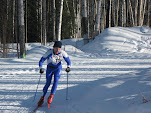Chena River Run Age Grade Scores 2012
Dorli McWayne did it again, with an age graded 92.4. The record for McWayne's age is an 18:52, so she's barely 1.5 minutes off of that. Really really solid. Jane Lanford also posted a good time (21:26) and score (84.5). Interestingly the top 5 women were the same runners as last year.
Among men, we had five in the 80s. Chad Carrol ran a little slower (12 sec off from last year), but scored higher (81.3% to 79.3% last year). That's a nice thing about age grading is that as long as you can maintain--or even improve a little--you can bump your percent.
WOMEN'S
RUNNER ........[YOB] TIME (AGE GRADE PERCENT)
Melissa Lewis.. [1970] 20:00 (76.9)
Dorli McWayne.. [1952] 20:25 (92.4)
Jane Lanford... [1955] 21:26 (84.5)
Erika VanFlein. [1959] 22:49 (75.3)
Deena Doublex.. [1950] 25:59 (74.7)
MEN'S
RUNNER ........[YOB] TIME (AGE GRADE PERCENT)
Chad Carrol.... [1971] 16:55 (81.3)
Roger Sayre.... [1958] 17:35 (86.6)
Mark Lindberg.. [1963] 17:43 (82.6)
Gary Holton.....[1963] 18:17 (80.8)
Dave Leonard... [1955] 19:13 (81.3)
Age grading, while not perfect, can give incentive to keep going. I alluded to that yesterday on Facebook, when I posted that runners actually look forward to moving up in age groups because of age classes/age grading. One of my runner friends shot back, geez within about 6 seconds, "Some runners maybe." Well, if you want to set a personal best every time out, I can see that. But realistically if you're into running for the long haul you will not be setting PBs every time out--for a competitive runner that window of improvement will range from about 5 to 15 years.
After that, then what? The alternatives are pretty much die, quit the sport, or just become a fitness jogger. Age grading provides a way for runners to still have fun and it is a quantifiable means to push the limits when those personal bests are years or decades in the rearview mirror.


0 Comments:
Post a Comment
Subscribe to Post Comments [Atom]
<< Home